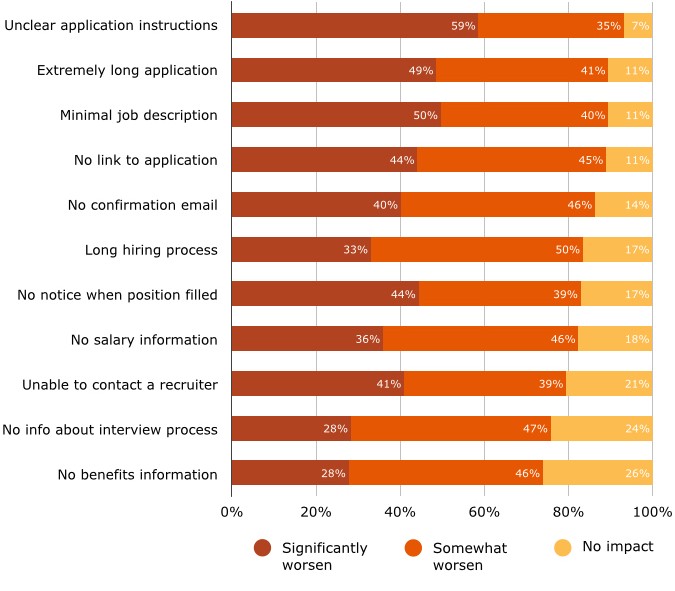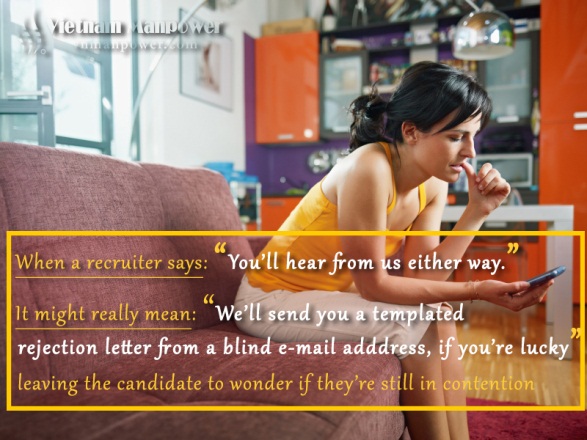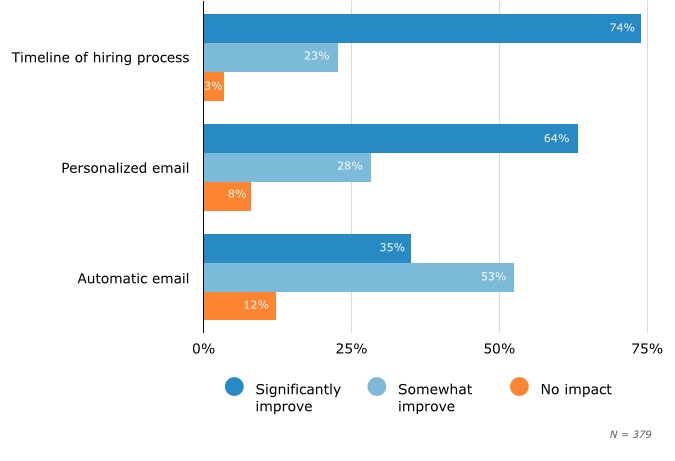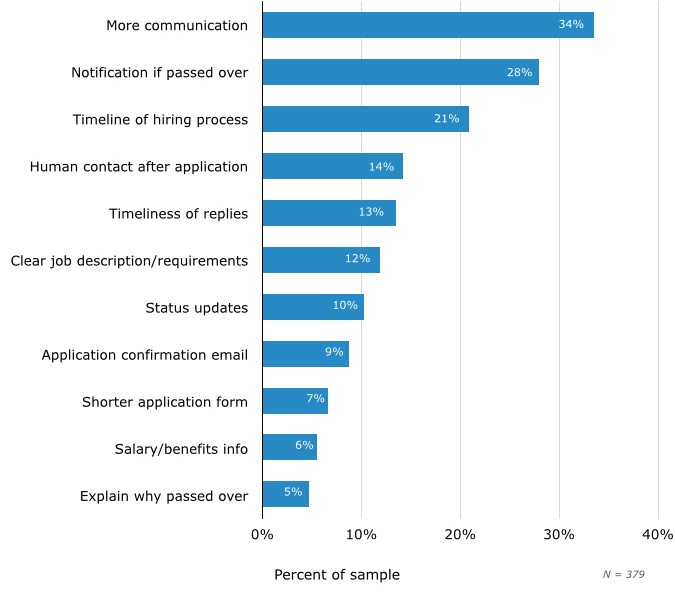I have previously written about whether it is time for recruiters to put themselves in candidates’ shoes. This time, I will narrow down the topic and dig deeper into the candidate experience (i.e. its definition, importance, how candidates really think about how you treat them, and how to improve candidate experience).
What is candidate experience?

While new-hire experience is defined as impressions and perceptions that new comers have after they accept a job offer throughout the on-boarding process, candidate experience has to do with impressions and perceptions created by the experiences a job candidate has when (s)he applies for and is considered for a job. These impressions and perceptions are often formed depending on the information they obtain, communication they receive, and interactions they are involved in during the selection, recruitment processes.
Why a negative candidate experience can be bad for your company?

The candidate experience is an integral part of the recruitment process that can affect how effective a company is able to recruit quality candidates, and is essential to a company’s overall brand. Multiple studies have defended that the candidates that are not hired but were treated well would be more likely to apply again, refer the enterprise to their peers and remain the company’s customer or admirer. A positive candidate experience contributes to successful employer branding that has been considered one of most dominant recruitment trends in 2016.
Specially,
• The negative candidate experience can affect the company’s business – As found in CareerBuilder’s Applicant Experience study that tracked the experiences and opinions of over 800,000 U.S workers across industries who applied to jobs from June 1, 2011 to April 30, 2012, 44% of candidates who didn’t hear back from an employer when they applied for a job said that they have a worse opinion of that employer. According to the CareerBuilder survey on over 2,000 employers and 5,000 workers from U.S in 2012, almost one-third of job seekers (32%) reported that they are less likely to buy a product from a company that didn’t respond to their job application.
• Bad experiences can spread throughout someone’s personal network, or even go viral – As per CareerBuilder and Inavero study on over 4,500 workers in the U.S in 2011, 3 in 4 workers (78%) said that they would talk about a poor experience they had with a potential employer with their friends and family. 17% said they would post something about their bad experience on social media, and 6% said they would blog about it.
• Poor experience in the recruitment process can cause the candidates to reject the job offer, distract the candidate’s interest in the employer’s job post in the future – According to CareerBuilder’s Applicant Experience study, when asked to assess the recruiters that contacted them, 1 in 5 job seekers (21%) reported that the recruiter wasn’t enthusiastic about his/ her firm being an employer of choice. 17% didn’t believe the recruiter was knowledgeable, and 15% didn’t think that the recruiter was professional.
Try to walk a mile in your candidates’ shoes
When did you last put yourself in your candidates’ shoes? How would you feel if you were the one who received some of your company’s automated email responses? How would you feel if you never heard anything after submitting your application to a company that had wanted to work for very much?
More and more candidates feel disrespected during their recruitment process.
• The application process

Have you gone through your own application process? Not think about how the process works, but really go through it? Go on – create a resume and submit it through your jobs page portal and see what happens.
Are the application instructions clear? Can you apply via a mobile device? Are you asked to spend 30-45 minutes answering a series of pointless questions? While doing this, what is going through your head? Maybe your thinking, “I spend 30 minutes of my life in this, and I may not hear feedback from them. What a waste!”
Now think for a moment about how many candidates are indeed giving up at this point. What if the best talent is not even completing their application, instead, choosing to abandon because it is simply too hard?
According to a 2015 survey by Software Advice on about 400 respondents across the world who had applied for a full-time job in the last 12 months, a negative candidate experience is primarily caused by unclear application instructions, cited by 93% of job seekers. Extremely long application forms are the 2nd most common cause of a bad candidate experience, reported by 90% of job seekers.

• The selection process

Once a candidate was shortlisted for the interview, they must come up to certain required standard. So if they have taken time out of their day to come and meet with you, you need spend a decent amount of time with them, even if you feel they may not a good fit. For instance, say it took them 45 minutes to come to your office, and another 45 minutes to come back to work, but you just spend 10 minutes with them. How do you think they will feel? What kind of message does that send? What would you think you would share in your personal and social networks if you were them in this situation?
How you treat them on the day will leave a lasting impression whether or not they eventually get the job. Even the best candidates will self-eject and find for another job opportunity elsewhere if they aren’t professionally treated during the selection process.
-
The rejection process

A common complaint from candidates is that they never hear anything after their job interview.
Sure, it is easy to call a candidate and tell them how satisfied you were with them and offer them a job in your company. It is not really easy to call a candidate and tell them they have not been successful. Still, it is something you need to do to maintain your professional reputation in the marketplace.
Think about this – after putting effort in preparing an application and then sweating over the interview process, most of the time, taking away hours of their current job to do so, the candidates then get no promise for call-back time and hear nothing from you for many weeks, until finally they are forced to conclude that they were passed over.
-
The communication process
When hiring talent for any organization, communication has always been the key. Good communication will make candidates feel important and wanted.
Way back to recruitment in the 90s, when we could not create automated email sequences to respond to job candidates, and we actually had to call phone and speak to every single one of them. That’s why we were able to gauge quickly how a candidate was feeling and respond accordingly. Also, that time, there were no social media platforms for angry candidates to share their frustrations and blacklist your company with everyone they knew. Today, when the era of Internet is everywhere, if you have created a poor candidate experience, the world will easily know about it and your employer brand can be tarnished.
Candidates genuinely want to be provided as much information as possible at every stage of the recruitment process. And whilst some candidates may assume ‘no news to be good news’, others may consider ‘no news’ as they having been rejected. If you don’t want them to make the wrong assumption, maintain your reputation and get best candidates, optimize your communication.

(Source: Impact of Communication Methods on Candidate Experience - The 2015 survey by Software Advice)
Out of 3 communication methods, the most impactful for candidates is the clear timeline of the hiring process. 74% of job seekers say that this tactic would “significantly improve” their candidate experience, whilst just 3% say it would have “no impact”. The second most impactful is personalized emails.
How to improve candidate experience
• Improve the application process

(Source: Candidates’ Suggested Improvements to Application Process - The 2015 survey by Software Advice)
Over one-third of job seekers (34%) said that more communication during the recruitment process would improve their candidate experience. The primary thing the job seekers said would better their candidate experience is a clear timeline of the actual hiring process (reported by 74%, according to the Software Advice survey in 2015).
• Make the job candidate feel relaxed, valued in the selection process and be aware of exactly what the interview process will involve.
• It is Ok to send unsuccessful candidates automated rejection emails. A 3-5 minute personal phone call to notify them about the result and provide them with feedback is the best way that helps maintain your employer brand.
• Role play with your ambassadors – Your employees are greatest ambassadors of your employment brand. Conduct practice interviews with your employees, survey them to get their feedback.












Replies to This Discussion